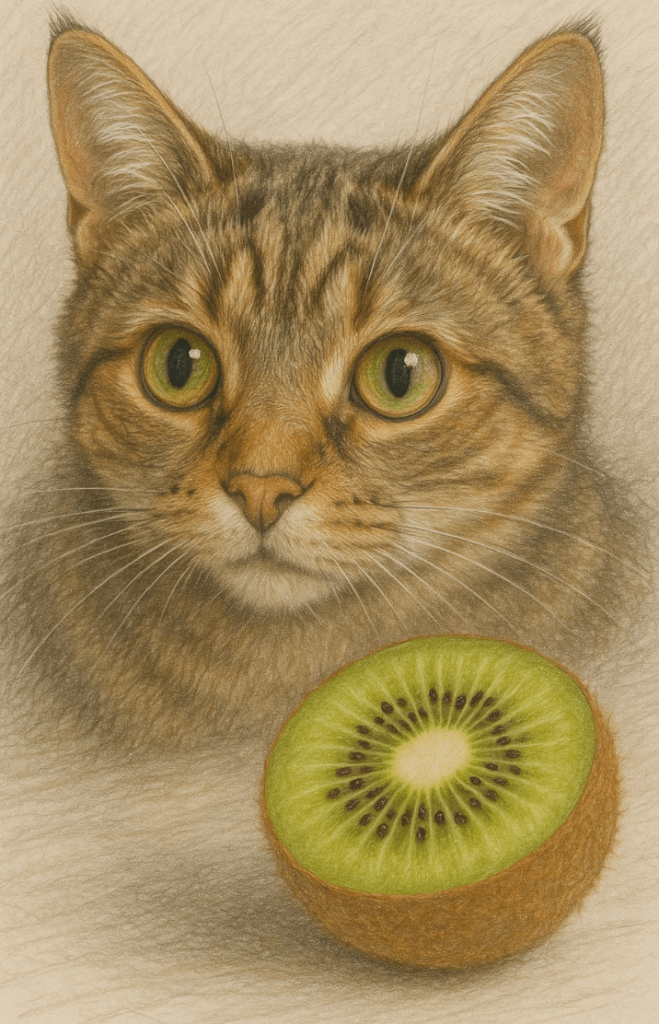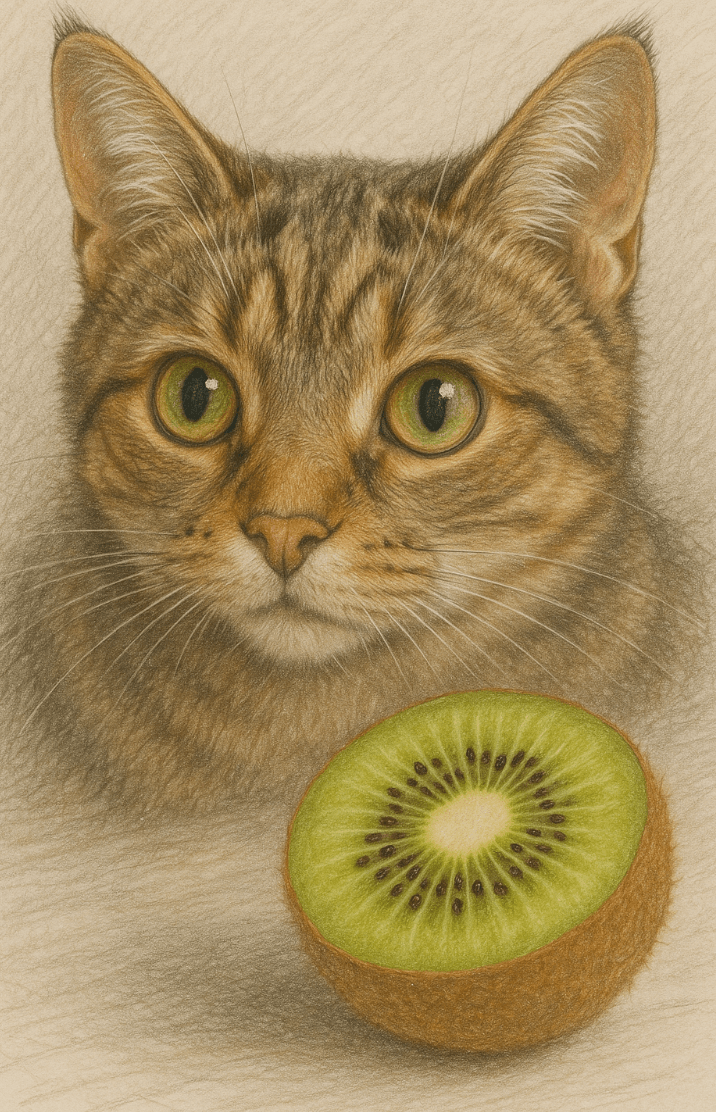Can Cats Eat Kiwi?
When it comes to feeding our feline friends, many pet owners wonder whether fruits like kiwi are safe for cats. While cats are obligate carnivores and primarily rely on meat for their nutrition, they may occasionally show curiosity about human foods. Kiwi, with its vibrant color and tangy flavor, might catch your cat’s attention, but is it a healthy snack or a potential hazard? Understanding the effects of kiwi on your cat’s health is essential to ensure their safety and well-being. In this blog post, we’ll explore everything you need to know about feeding kiwi to your cat, including its benefits, risks, and safer alternatives.
Potential Benefits of Feeding Kiwi to Cats (In Moderation)
While cats don’t require fruits as part of their diet, small amounts of kiwi can offer some nutritional benefits if given sparingly. Here are a few reasons why kiwi might be a safe occasional treat.
Rich in Vitamins:
Kiwi contains vitamins like C and K, which support immune function and overall health in small doses.High in Fiber:
The fiber content in kiwi can aid digestion, though too much may have the opposite effect.Hydration Boost:
With its high water content, kiwi can help keep your cat hydrated, especially if they’re reluctant drinkers.Antioxidant Properties:
Antioxidants in kiwi help combat free radicals, potentially supporting long-term health.Low in Calories:
Kiwi is low in calories, making it a light snack that won’t contribute to weight gain when fed in tiny amounts.
While these benefits exist, it’s important to remember that cats don’t derive significant nutritional value from fruits like kiwi. Always prioritize their primary dietary needs.
Risks of Feeding Kiwi to Cats
Despite its nutritional qualities, kiwi poses several risks to cats if not offered carefully. These hazards highlight why moderation and supervision are crucial.
Digestive Upset:
The high fiber content in kiwi can cause diarrhea or vomiting if consumed in large quantities.Allergic Reactions:
Some cats may be allergic to kiwi, leading to symptoms like itching, swelling, or difficulty breathing.Choking Hazard:
The small seeds or chunks of kiwi can pose a choking risk, especially for curious cats who gulp food quickly.Sugar Content:
Kiwi contains natural sugars, which can be harmful to cats in excess and may lead to obesity or diabetes over time.Toxicity Concerns:
While kiwi itself isn’t toxic, pesticides or chemical residues on unwashed fruit could harm your cat.
These risks underscore the importance of offering kiwi only as an occasional treat and in small, manageable portions.
Check this guide 👉Can Cats Eat Olive Oil? Best 7 Expert Tips!
Check this guide 👉Can Cats Eat Beef Jerky? Best 7 Expert Tips!
Check this guide 👉Can Cats Eat Cashews? Best 7 Expert Tips!

Safe Alternatives to Kiwi for Cats | Foods to Avoid Giving Cats |
|---|---|
Blueberries (plain, unsweetened) | Grapes and raisins (toxic to cats) |
Watermelon (seedless, plain) | Onions and garlic (can cause anemia) |
Apples (cored, no seeds) | Chocolate (highly toxic) |
Pumpkin puree (unsweetened) | Alcohol or caffeine |
Plain cooked carrots | Raw yeast dough (can expand in gut) |
How to Safely Introduce Kiwi to Your Cat
If you decide to give your cat a taste of kiwi, it’s essential to do so safely and responsibly. Follow these guidelines to minimize risks and ensure a positive experience.
Start with Tiny Portions:
Offer a small piece of peeled kiwi—no larger than the size of your fingernail—to gauge your cat’s reaction.Remove Seeds and Skin:
The seeds and skin can be difficult to digest; always serve only the soft, fleshy part of the fruit.Monitor for Reactions:
Watch for signs of digestive upset, allergies, or disinterest after introducing kiwi.Avoid Sweetened Variants:
Never feed your cat kiwi-flavored products or those with added sugar, as they can be harmful.Consult Your Veterinarian:
Before introducing any new food, seek advice from your vet to ensure it aligns with your cat’s dietary needs.
By following these steps, you can safely determine whether your cat enjoys kiwi without compromising their health.
Signs Your Cat May Not Tolerate Kiwi
Even if kiwi is generally safe in moderation, some cats may not tolerate it well. Watch for these warning signs to act quickly if something goes wrong.
Vomiting or Diarrhea:
These symptoms indicate digestive distress, likely caused by consuming too much kiwi or its fiber content.Lethargy or Discomfort:
A sudden lack of energy or signs of pain may suggest an adverse reaction to the fruit.Excessive Drooling:
Drooling could signal irritation or discomfort caused by the texture or taste of kiwi.Pawing at the Mouth:
This behavior often indicates that your cat is experiencing discomfort or has a foreign object stuck in their mouth.Refusal to Eat:
If your cat avoids kiwi entirely, respect their preferences and avoid forcing them to try it.
Recognizing these signs early allows you to remove kiwi from their diet and prevent further complications.
Common Mistakes to Avoid When Feeding Fruits to Cats
Feeding fruits like kiwi to your cat requires careful consideration to avoid mistakes that could endanger their health. Here are some pitfalls to watch out for.
Overfeeding Fruits:
Too much fruit can upset your cat’s stomach and disrupt their balanced diet.Ignoring Allergies:
Not all cats tolerate fruits well; failing to monitor for allergic reactions can lead to complications.Offering Sugary Variants:
Sweetened or processed fruits contain additives that can harm your cat’s health.Neglecting Portion Sizes:
Large pieces of fruit can pose choking hazards or overwhelm your cat’s digestive system.Skipping Veterinary Advice:
Introducing new foods without consulting your vet can result in unintentionally harming your cat.
Avoiding these mistakes ensures a safer and healthier experience for your cat.
Alternatives That Mimic the Fun of Trying New Foods
If you’re hesitant about feeding kiwi or other fruits, there are plenty of alternatives that mimic the fun of trying new tastes without the associated risks.
Cat Grass:
Many cats enjoy nibbling on cat grass, which aids digestion and satisfies their craving for greens.Freeze-Dried Meat Treats:
These treats provide protein-rich nutrition and a satisfying crunch that cats love.Interactive Toys:
Puzzle feeders and chewable toys stimulate your cat mentally and physically, fulfilling their need for engagement.Bone Broth Supplements:
Strained, sodium-free bone broth offers nutrients found in bones without the choking hazard.Soft Edible Chews:
Designed for cats, these chews promote dental health and are easy to digest.
These alternatives allow you to cater to your cat’s instincts while keeping them safe.
Understanding Your Cat’s Natural Instincts Around Food
Cats are naturally drawn to foods that align with their evolutionary history as hunters. Understanding their instincts helps explain their fascination with human foods like kiwi.
Hunting Behavior:
Wild cats often consume entire prey, including organs and small amounts of plant matter, mimicking their instinctive drive.Teething and Chewing Needs:
Kittens and young cats chew on objects to relieve teething discomfort, making fruits appealing textures.Nutrient Seeking:
Cats crave specific nutrients found in meat, which are essential for their growth and development.Playful Exploration:
Cats use their mouths to explore new textures, and fruits like kiwi provide an intriguing sensory experience.Territorial Marking:
Chewing and gnawing on objects like fruits can serve as a way for cats to assert ownership or relieve stress.
By recognizing these behaviors, you can better address your cat’s needs in a safe and controlled manner.
Frequently Asked Questions About Cats and Kiwi
Is kiwi toxic to cats?
No, kiwi is not toxic, but it should only be given in small amounts due to its sugar and fiber content.
Can kittens eat kiwi?
Kittens have sensitive digestive systems, so it’s best to avoid giving them kiwi altogether.
How much kiwi can I give my cat?
Limit it to a tiny piece once or twice a month—never make it a regular part of their diet.
What should I do if my cat eats too much kiwi?
Contact your veterinarian immediately if your cat shows signs of illness after consuming kiwi.
Are there other fruits cats can eat?
Yes, small amounts of blueberries, apples (seedless), or watermelon (plain) are safer options.
Prioritizing Your Cat’s Health When Offering Kiwi
While kiwi can be an occasional treat for cats, it’s not a necessary part of their diet. Cats thrive on animal-based proteins, and their nutritional needs are best met through high-quality cat food. If you choose to share a small piece of kiwi with your feline friend, always do so cautiously and in moderation. By understanding the potential benefits and risks, you can ensure your cat stays healthy and happy. Remember, your cat relies on you to make the best dietary choices for them—so always prioritize their well-being above all else.
Do Cats Have Taste Buds? Best 7 Expert Tips! – Discover how cats experience flavors and why their taste is so unique.
Do Dogs Have Taste Buds? Best 7 Expert Tips! – Discover how dogs experience taste, their preferences, and what it means for their diet and health.
Can Cats Taste Sweet? Best 7 Expert Tips! – Discover why cats can’t taste sweetness, how it affects their diet, and tips to keep them healthy and happy.
Can Dogs Taste Sweet? Best 7 Expert Tips! – Discover how dogs perceive sweetness, which foods are safe, and tips to manage their sweet cravings responsibly.





